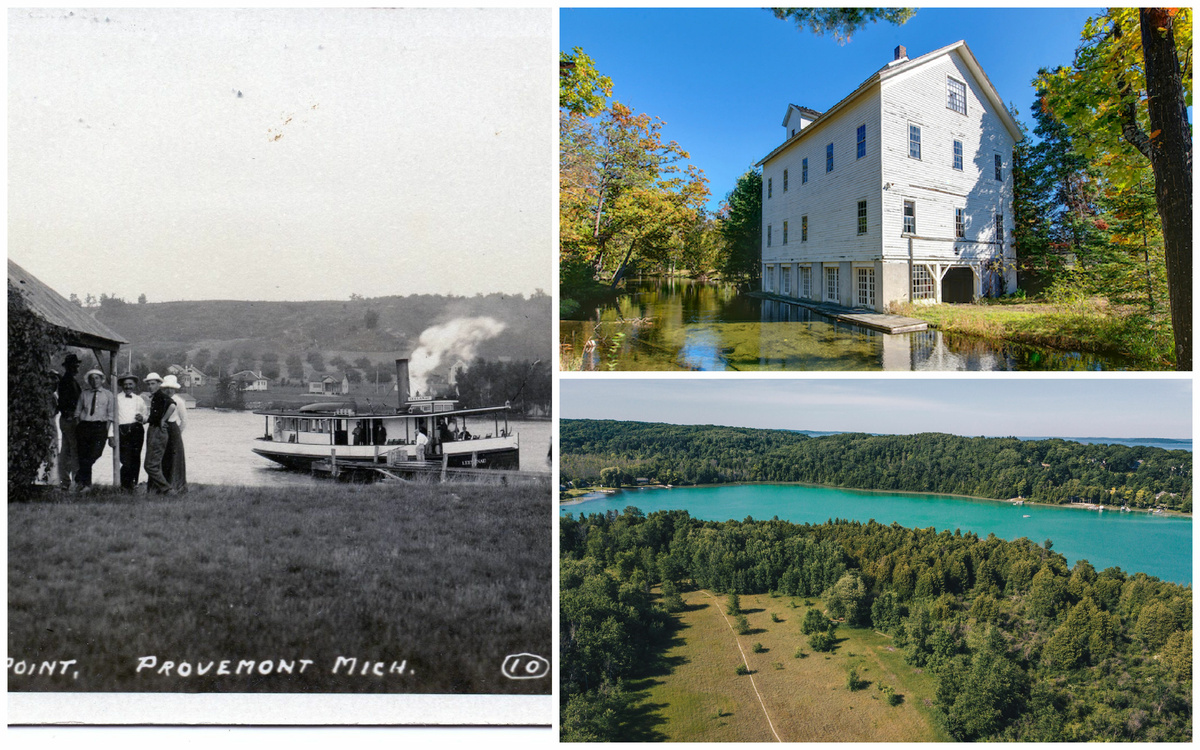
Leelanau Landmarks Part Three
By Ross Boissoneau | April 14, 2023
The Leelanau Ticker continues looking at historical sites in the county in Part Three of our series. Some have been restored to their former glory, while others never stopped being glorious.
Fountain Point Resort
Credit French fur trader Aymar de Belloy for the founding of what was to become Fountain Point Resort. While drilling for oil in 1867, he struck a gusher of sparkling water at a depth of 900 feet, which became the property’s namesake. The deep underground aquifer boasted a high content of sulfur, and the property was dubbed Fountain Point Resort and Mineral Springs. Its popularity was such that it became a stop on the Traverse City, Leelanau, and Manistique Railroad (later the Leelanau Transit Company).
It passed through the hands of several owners until it was purchased in 1936 by longtime guest Victor A. Gebhardt. His granddaughter Susan Nichols is the present owner, and the property is managed by her son Erik Zehender, the fourth generation of his family to do so. And just as the property has been passed down for generations, so too have generations of guests been staying at the property, often renting the same cabins for decades. The 54-acre property includes a half-mile of waterfront on Lake Leelanau, and remains a popular location for family reunions, vacations and weddings. It’s even been written up in Martha Stewart Weddings.
Fountain Point Resort is home to the Lake Leelanau Rowing Club, rowing camps, and the rowing team from the University of Michigan practices there. The expansive lawn has hosted many concerts over the years, with acts ranging from the Accidentals to Josh White Jr. to the Grand Rapids Symphony Orchestra. One of the oldest historic resorts in the state, Fountain Point is listed on The National Register of Historic Places. It is scheduled to open for the summer May 18.
The Old Mill, Glen Arbor
Gristmill to recording studio? Abandoned building to café? Yes, the old mill in Glen Arbor has had an interesting history, and now is settling in on its latest act. According to the Leelanau Historical Society Museum, the mill was constructed by Thomas Kelderhouse in 1879 and purchased by Frank and Matilda Brammer in 1897. When he died in 1923, his sons August and Martin inherited it, and ran it until 1945, when the large-scale mills basically squeezed it out of business. They sold it to a Dr. Longyear in 1964, who made some improvements in the buildings, then sold to Fred Ball in 1970. Ball, a scion of the Ball canning jar family, didn’t lack ambition or vision: He finished the basement, installed a music studio, and added on the back of the Mill to remake furniture.
A 1976 article in the Ann Arbor Sun extolled the virtues of the studio, including a list of its extensive (and no doubt expensive) equipment. But it also noted what would become its downfall: a lack of clients interested in recording in such an isolated location, far from any urban area. “Unfortunately, Ball has tended to depend on the organic process to bring in paying clients for the studio, and the results have been just about what one would expect in this age of high-powered advertising: next to nil.”
In 1985 Ball sold the mill to Bob Kuras, owner of the Homestead Resort, who sold it to Turner Booth in 2018. Booth spent nearly two years stabilizing and rehabbing the 7,195-square-foot mill and miller’s house, and a vote in August 2021 to approve rezoning the property to recreational enabled him to continue his plans. Those include partnering with Fernhaus hospitality in a café (currently open), restaurant, lodging and museum. Kelsey Duda, president at Fernhaus Studio, says they hope to have two guest suites and cottage opened by Memorial Day. She says the décor leans into the mill’s history and emphasizes the river views.
Campbell-DeYoung Farm, a.k.a. DeYoung Natural Area
The property’s engaging history dates back to the mid-1800s, when Henry Campbell purchased an 80-acre parcel and constructed a Victorian house there. Other buildings followed, including a carriage house/garage, hay barn, upper barn and granary, all prior to 1900. A powerhouse/workshop was constructed in about 1900 to house a waterwheel to power the farmstead.
Henry sold the property to his son Julius in 1904, who added other buildings to the site. Julius sold to Dr. Marc Kroupa and his wife Myrtle in 1919, who in turn sold it to their daughter Iris and her husband Louis DeYoung in 1925. The thrice-married Louis eventually began exploring ways to preserve the farm. Four years after his death in 2004 (at age 104!), his son Ted sold the farm to the Leelanau Conservancy. Today the 191-acre DeYoung Natural Area boasts 2.3 miles of trails, including a portion of the TART trail. A half-mile universal access trail leads to a lakeside fishing pier and viewing platform with views of Cedar Lake. The property includes one mile of Cedar Lake shoreline, much of it wetlands critical to the health of the lake. There are educational panels throughout this area, while docent-led hikes feature learning opportunities about its history. It includes two streams, wetlands, and nesting habitat for resident and migratory birds such as warblers, orioles, meadow larks, red-winged black birds and green heron.
Matt Heiman, director of land programs with the Leelanau Conservancy, says the family turned down many offers from developers and sacrificed financially by offering the property to the Conservancy. Under current zoning regulations, the property could have been developed to include as many as 100 homes. The farmstead contains the only remaining buildings on any of the Conservancy’s natural areas. The Conservancy is working to preserve some of them, including the original farmhouse.
Read Part One of our series here and Part Two here.
CommentSugar Loaf Lives: Leelanau Conservancy Announces Acquisition, Revitalization Plans For Long-Dormant Resort Property
Leelanau County’s crown jewel is (finally) ready to shine again.
The Leelanau Conservancy announced Thursday that it …
Read More >>Small Farm Conference Details Announced
Crosshatch Center for Art and Ecology has released details for the 2025 Northern Michigan Small Farm Conference, …
Read More >>Glen Lake Association Launches New Survey To Inform Forthcoming Strategic Plan
The Glen Lake Association (GLA) is inviting members of the local community to participate in a brand-new …
Read More >>Property Watch: Three Levels in Leland (On The River!)
This three-level home has 40 feet of private waterfront on the Leland River and a "perfect blend …
Read More >>



